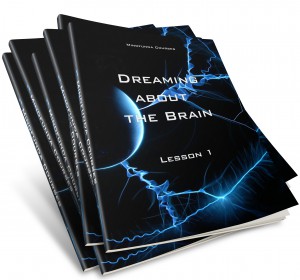Being Conscious to me is knowing who you are. Having a concept of self. Being type one diabetic I have experienced first hand what can go wrong with this concept of self due to low blood sugar level (hypoglycemia). I remember how I, at one point in time, felt that I could not walk anymore in a straight line. I fell down.
Some teenagers started laughing because they thought I was drunk, or a drug user. I remember clearly how my brain reported back to

me that things were going wrong. I needed help but where could I find help in such a hostile environment? In the mean time a crowd had gathered around me. I felt lost and completely ashamed of myself. My brain was working like mad to get me out of trouble. Who was I? I could not remember… Had I experienced something like this before? A lightbulb began to flash inside my brain. Yes I had behaved like this before and there was a solution. It was like something clicked, like I felt the neurons in my brain connecting and sending “me” the right information. I scanned my mockers. Was there somebody who was kind and brave enough to see me as a person instead of a laughable drunk? Who could I trurn to to be my brain on the outside, someone who was kind and had a clear thinking mind. I approached an older man with a beard and I said: I need sugar, there is some in my pocket, could you please give me something? And he did! I felt so relieved… We all have this need sometimes. To reach out to somebody who has a clear thinking mind. I have recently written an online course about his concept of Self: Dreaming about the Brain
evolution and being Conscious
Like my experiences with low blood sugar level showed you in the last paragraph, being conscious starts in the brain. Low blood sugar level changes your concept of self, but even in such events, there is always that man or woman in your head that informs you about situations. Neurologist Daniel Wolpert even was invited to give a Ted Talk explaining that we only evolved a brain to engage in movement. And was it the movement of my body that enabled that voice in my head to step foreward and give me directions to safe myself?
My online course not only touches upon the concept of the Self in waking life and in dreams. One lesson is dedicated to the brain and religion. Here special attention will be focussed upon near death experiences (I had one myself and I interviewed expert P.M.H. Atwater about it). I will talk about the famous God Helmet experiment of Stanley Koren.
Concious questions
If you have questions like: “What happens in the brain when I hear that guiding voice?” or “Who am I?” or “Where is consciousness in the brain?” than my course Dreaming about the Brain can give you the answers you need. The course consists of six lessons.
The Architecture of the Brain: here you will learn about the basic components of the brain. In the first chapter we will explore several “brain basics” like electricity, neurons, and the brain stem. In the second chapter, we will use the four lobes that structure the brain to inform you about their function.
The Big Dream Theories about the Brain: the Activation-Input-modulation (AIM model of Alan Hobson, The Neurocognitive model of Domhoff and the Psychodynamic model of Mark Solms.
Visualization, Dreaming and the Brain. What is this dreaming pathway and how does it deal with imagery? Does visualization play a role? How do blind people dream? These questions will be answered in this lesson.
Where is the “I” in the Brain? Can the concept of Self be pinpointed in the brain?
Religion and the Brain. Some say our brain is wired for religion. Religion used to be composed from dreams given by the divine.
Lucid Dreaming and the Brain. Some neurologists claim that Lucid dreams are no form of sleep but a mere sense of meditative consciousness. What does the latest research say about this?
Find out more information about: Dreaming about the Brain
@susannevandoorn
Download my free ebook about Mutual Dreaming


I know this is scary and feel for you, Susanne. I hope you don't have these experiences again. I have Meniere's Disease, a problem with inner ear pressure which can make it impossible to stand or even move because of intense vertigo and nausea. When these symptoms arrived the first time, I was walking with a loving friend who helped me through. It took time to find my "sugar equivalent"–an emergency medicine that stops the inner ear chaos from translating to central nervous system chaos. As with hypoglycemia, I have clear thoughts and know what to do for myself even if I'm lying on the ground. I have medicines that work and keep them close by. So, a reminder that we are more than body.
Elaine thank you for your comment. Yes we are so much more than the body. My blog was an invitation for people to explore the bridge between spirit and body. Because if blood sugar level affects the mind so much, in what way does it all people? (How) has Meniere’s disease connected you with that inner observing voice that tells you things are going wrong and that you need to sit down and take care of yourself? I bet you know what i mean. There is an innate sense of self that takes care of you when your conscious me is not able to do that.